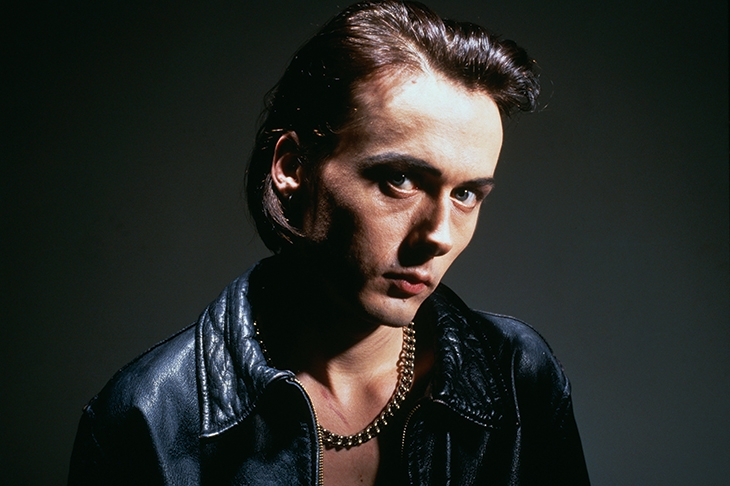‘I always think they’re not lusting after me,’ Brett Anderson says of the middle-aged fans who still turn up to see his band Suede and leave the shows a little flushed and excited. ‘They’re lusting after something that doesn’t really exist. They’re remembering their wild youth. It’s faintly comical to me when I think about myself in the 1990s and the sexuality of it. That got a bit out of control, I suppose. And it’s odd, because I’m quite a reserved person in lots of ways, so I don’t really know what was going on there.’
Oh, Brett, you do yourself a disservice. Look at yourself! Not an ounce of flab, dressed like a clothes-horse, face all sharp lines and clean planes. You’re a well-preserved man.
‘Well, thank you.’
I tell him that a couple of years ago, my price for interviewing him on stage at the Barbican in London had been that my wife got to meet him, at which he cackles. ‘I don’t know if people would still feel the same way if they really knew me. So much sexual attraction is about how people really are, rather than what they look like.’ Which is easy to say when you look like him.
Anderson turned 51 this week and he has managed a remarkably dignified third act in his pop life. Suede recorded five albums in nine years from 1993, topping the charts and, for a while, being absolutely ubiquitous (‘There was an odd period in 1993 when everything I picked up, not just music papers, had some reference to Suede. It was incredibly exciting’). The last two albums, though, were pretty crappy: Anderson was smoking crack and the band’s moment had passed.
A solo career followed, with polite reviews to match. But then Suede returned in 2010, initially for a benefit gig; the reunion stuck well enough that they began recording again. The Blue Hour, released this month, is the third terrific album they’ve made since their reformation.
Does he ever miss being central to the culture, the way he was when he was a young man? ‘Why would I miss that? If I want to make myself heard, I feel as though I have a voice in the media. And I enjoy that, and I feel listened to by the people I want to be listened to by. But some sort of spokesman for a generation cliché cliché? Don’t want to do that. Not interested.’
People of his generation tend not to want spokesmen anyway. What I meant was: does he miss mattering in the wider culture, rather than just among his fans?
‘I suppose what I do miss is the traction that mainstream exposure can give you. I feel mournful about the fact that it doesn’t matter if we write the best song we’ve ever written in our lives and make the best album we’ve ever made in our lives. It simply won’t have the traction that we would have had in the 1990s. It simply won’t get across to as many people. It won’t be as successful and it won’t have that cultural resonance any more.’
You’d think Anderson would be ina fairly sanguine state these days. He’s married with a teenage stepson and a six-year-old son. The family lives in the countryside (though Anderson keeps a flat in Holland Park, where we meet, and still thinks of himself as a Londoner), and The Blue Hour is a country rather than a city album, albeit one of dead animals and the terror in the woods, rather than haystacks and romps in the meadows.
He’s not just the singer in Suede, either. His memoir Coal Black Mornings, published earlier this year, is a fascinating account of a very eccentric childhood in a family with middle-class aspirations and a poverty-line income. He’s somewhere on the course of honour that leads not to a visit to the Palace for the pinning of a medal, but to being described as ‘a national treasure’.
Even so, he’s terrified. In Coal Black Mornings, he writes of his conviction that his childhood would be ended at any moment by nuclear war. Now, he says, he’s plagued by ‘terrible night thoughts. I imagine the worst the whole time. I have to force myself back to sleep.’ He moves on seamlessly to his discomfort at parties, how he hides behind his wife, how he finds small talk awkward and replays conversations later, looking for evidence of his own humiliation.
‘I used to hide behind the mask of slightly aloof out-of-my-headness. And now, because I don’t hide behind that mask anymore, I have to actually engage with people, and I suppose I’m a bit more self-conscious about it. We’re not in our twenties anymore, lying around on the floor snogging people. We’re talking about…’ — at this point, as he often does when he wants to signify a bourgeois affectation he’s unhappy about, Anderson adopts a sneering voice — ‘where we went on holiday. As I get older I feel more socially conscious because I don’t have those crutches that I used to have. But you have to be an adult. If you’re going to live in this adult world you have to live by its rules.’
The connection between the dignified, fiftysomething Brett Anderson, and the one who used to prance around on stage in a woman’s blouse, slapping his bum, is the persona of the pop star. Being Brett Anderson Out Of Suede used to be a full-time job, until there was more of Brett Anderson Out Of Suede than there was of the man himself, like Michael Redgrave being taken over by his ventriloquist’s dummy in Dead of Night.
‘I’ve spent the past 15 years deconstructing that dummy,’ Anderson says. ‘He’s in the cupboard in pieces. I think you leave your persona behind when you have kids. Persona is so born of ego — it’s a brittle mask that you wear, and as soon as you have kids that mask gets shattered because you realise you’re not the most important person in the world. It’s a fascinating thing, person vs persona, and I think about it ever such a lot — the kind of things you go through when you achieve fame and success, because they do really distort you as a human being, and it’s a fascinating journey.’
Now the persona only comes out when Anderson takes to the stage, something he needs to do to get through that hour and a half. He flicks the fringe from his face, wriggles his hips, undoes a button more than might be strictly necessary on his tailored shirt. And the middle-aged people in the crowd allow the lustful thoughts in. And I don’t think they’re all just trying to relive their youths.






Comments